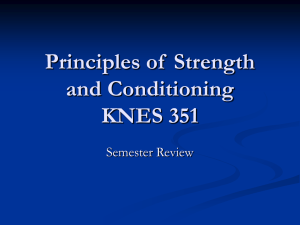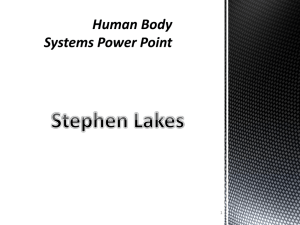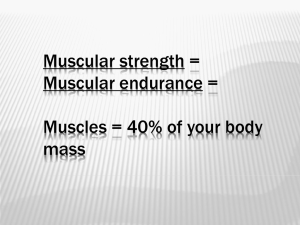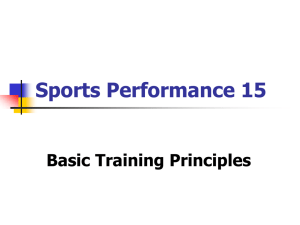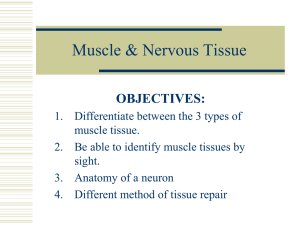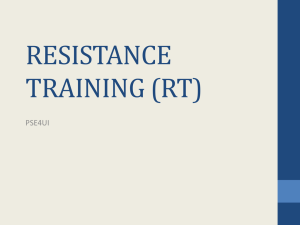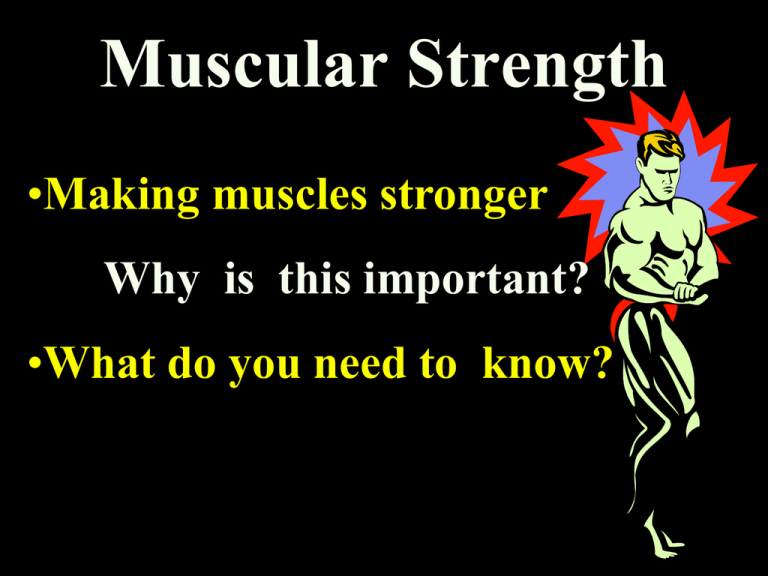
Muscular Strength
•Making muscles stronger
Why is this important?
•What do you need to know?
Objectives of Strength Training
•
•
•
•
•
•
General fitness
Body building
Bone fitness
Physical therapy and rehabilitation
Sport-specific applications
Muscle physiology
Muscular
System
Anterior view
Muscular
System
Posterior view
Muscle Physiology
• Muscles consist of many muscle fibers
(cells) connected in bundles
• Muscle fibers are made up of myofibrils
• Strength training increases the number
of myofibrils and the size of muscle
fibers = hypertrophy
• Inactivity reverses the process = atrophy
Skeletal Muscle Tissue
Muscle Fibers
• Slow-twitch fibers
– Fatigue resistant
– Don’t contract as rapidly and forcefully as fasttwitch fibers
– Rely primarily on oxidative (aerobic) energy
system
• Fast-twitch fibers
– Contract rapidly and forcefully
– Fatigue more quickly than slow-twitch fibers
– Rely more on nonoxidative (anaerobic) energy
system
Motor Units
Motor units (nerves connected to muscle fibers) are
recruited to exert force
Physiological Effects of Strength Training
– Increased muscle mass and size of muscle fibers
– Increased utilization and coordination of motor
units
– Increased strength of tendons, ligaments, and
bones
– Increased storage of fuel in and blood supply to
muscles
– Improvements in blood fat levels and biochemical
processes
Benefits of Muscular Strength
and Endurance
Improved performance of physical activities
Injury prevention
Improved body composition
Enhanced self-image and quality of life
Improved muscle and bone health with aging
Prevention, management of chronic disease
Factors that Modify Strength
Assessing Muscular Strength
and Endurance
• Muscular strength assessed by
determining repetition maximum (1 RM),
the maximum resistance that can be lifted
once
• Muscular endurance assessed by counting
the maximum number of repetitions of a
muscular contraction
Types of Strength Training
Exercises
• Static (isometric) exercise = muscle contraction
without a change in the length of the muscle
• Dynamic (isotonic) exercise = muscle
contraction with a change in the length of the
muscle
– Concentric contraction = muscle applies force as it
shortens
– Eccentric contraction = muscle applies force as it
lengthens
Muscle Actions
Concentric
Isometric
Eccentric
Types of Dynamic Exercise
• Constant resistance = constant load throughout a joint’s
range of motion
• Variable resistance = changing load to provide maximal
resistance throughout a joint’s range of motion
• Eccentric loading = placing load on a muscle as it
lengthens
• Plyometrics = sudden eccentric loading and stretching
followed by a concentric contraction
• Speed loading = moving a load as rapidly as possible
• Isokinetic exercise = exerting force at a constant speed
against an equal force
Plyometric Training
Creating a Successful Weight Training Program
Choosing equipment: Weight machines versus free
weights
– Resistance is provided by both types
– Exercise machines
• Safer, convenient, and easy to use
– Free weights
• Require more care, balance, and coordination
• Strength transfers to daily activities
Applying the FITT Principle
•
•
•
•
Frequency = days per week
Intensity = amount of resistance
Time = number of repetitions and sets
Type = strength training exercises for all
major muscle groups
Frequency of Exercise
• American College of Sports
Medicine recommends 2-3 days
per week
– Allow 1 full day of rest between
workouts
• 8 minutes in the morning- daily
Intensity of Exercise: Amount of Resistance
• Choose resistance based on your current fitness level
and goals
• To build strength
– Lift heavy weights (80% of 1 RM)
– Perform a low number of repetitions
• To build endurance
– Lift lighter weights (40-60% of 1 RM)
– Perform a high number of repetitions
• For a general fitness program
– Lift moderate weights (70% of 1 RM)
– Moderate number of repetitions
Time of Exercise: Repetitions & Sets
• To build strength and endurance, do enough
repetitions to fatigue the muscles
• The heavier the weight, the fewer the
repetitions (1-5) to fatigue = a program to
build strength
• The lighter the weight, the higher the number
of repetitions (15-20) to fatigue = a program to
build endurance
• To build both strength and endurance, try to do
8-12 repetitions of most exercises
Strength versus Endurance
Time of Exercise: Repetitions and Sets
• Set = a group of repetitions followed by a rest
period
• For general fitness, 1 set of each exercise is
sufficient
• Doing more than one set will increase strength
development
• Rest between sets
Type of Exercise
• For a general fitness program:
– 8–10 different exercises
– Work all major muscle groups
– Balance between agonist and antagonist
muscle groups
– Do exercises for large-muscle groups and
multiple joints before exercises for smallmuscle groups or single joints
Strength Testing
• Standardization
• Warm-Up
• Practice
• Muscle Angle
Testing 1-RM Bench Press - machine
Load:Repetition Relationships
One can perform high
reps with light loads, and
few reps with near max
loads
120
M
A
X
I
M
U
M
R
E
P
E
T
1
T
I
O
N
S
100
80
60
40
Strength Training Zone
20
0
20
40
60
Maximum Load
80
100
Which System is Best?
• Specificity rules [specific
adaptations to imposed demands
- SAID]
• Overload is the key
Comparative Training
Responses in Men and Women
•Muscular hypertrophy occurs to a
much greater extent in men
–Represents the largest sex difference in
response to resistance training
–Both sexes experience similar
percentage strength improvements
Creating a Successful
Weight Training Program (cont’d)
• Making progress
• More advanced strength training programs
• Weight training safety
–
–
–
–
using proper lifting techniques
using spotters and collars with free weights
use common sense when exercising on weight machines
be alert for injuries
Setting Up Your Program
• Avoid max lifts initially
• Use 12 to 15 reps initially
• Increase weight after 2 weeks
– Use 6 – 8 reps
– Progress gradually
• Work larger muscle groups first
(cont)
Detraining
Gains in strength may be seen
after 1 to 2 weeks of training
Training as few as 1 to 2 times
per week may be adequate to
maintain strength training gains
Combining Strength & Endurance Training
• Resistance training plus aerobic
training equals less strength
improvement
• Incorporate a break between workouts
• Health benefits of both types of
training may be obtained by training
for both strength & endurance
Muscle Soreness [DOMS]
•
•
•
•
•
Cell damage hypothesis
Spasm hypothesis
Tear hypothesis
Excess metabolite hypothesis
Connective tissue damage
hypothesis
Sex Differences in Strength
ABSOLUTE STRENGTH
• Upper Body - women 50% weaker
• Lower Body - women 30% weaker
RELATIVE STRENGTH
Human muscle can generate 3 to 8 kg force per
cm of muscle cross sectional area
On a relative basis women are just as strong as
men - and in the lower body, they are stronger!
Warm Up and Cool Down
• Warm up prior to each weight training
session with a general warm-up and a
warm-up for the exercises you will
perform
• Cool down after weight training, relax
for 5-10 minutes, lower your heart rate
Weight Training Safety
• Use proper lifting
techniques
• Use spotters and
collars with free
weights
• Be alert for injuries
A Caution About Supplements/ Drugs
• Supplements taken to increase muscle growth;
– Anabolic steroids
– Growth hormone
– Androstenedione
– Insulin and insulin-like growth factor (IGF-1)
Anabolic Steroids- ACSM Position
1. With adequate diet and trainingincreases in body weight occur often in
lean tissue.
2. No increase in aerobic power or capacity
for muscular exercise.
3. Associated with many adverse effects.
4. Use by athletes is contrary to rules and
ethical principles of competition.
Side Effects of Anabolic Steroids
•
•
•
•
•
•
Liver damage and tumors
Reduced HDL
High blood pressure, heart disease, cancer
Depressed immune function
Psychological disturbances
Depressed sperm and testosterone production
breast development in males
• Masculinization in women and children
• Premature closure of bone growth centers
Anabolic Steroids
• Drug with a considerable following
–Its becoming increasingly popular
with more than just strength
athletes
• Effectiveness
–Dosage is an important factor
–Training volume accompanying
use
Anabolic Steroids
• Structure and action
–Sterol structure similar to testosterone
–Promotes protein synthesis
• Stacking
–Combining multiple steroid
preparations in oral & injectable form
• Pyramiding
–Progressively increasing the dosage
Examples of oral and injectable anabolic steroids
Generic Name
Oxymetholone
Oxandrolone
Stanazolol
Nandrolone
Deconate
Androlone-D200
Commerical
Name
Anadrol-50
Oxandrin
Winstrol V
Durabolin
Deca-Durabolin
Neo-durabolic
Form
Retail $
Black
Market $
Oral: 50 mg
Oral; 2.5 mg
Oral; 2 mg
Inject; 25 mg/ml
Inject; 25 mg/ml
Inject; 50 mg/ml
$115/100 tabs
$420/100 tabs
$100/100 tabs
$275/ml vial
$12/2 ml vial
$12/2 ml vial
$200-500
$600-1600
$200-500
$200-500
$400-750
$450-750
Life-shortening Effects of Exogenous Steroids Use in Mice
Changes from
baseline in average
FFM, muscle, fat,
and strength over
10-wks of
testosterone
treatment
Growth Hormone
• Genetic engineering comes to sports
– Human growth hormone
• Produced in the Pituitary gland
• Stimulates bone & cartilage growth
• Enhances fatty acid oxidation
• Reduces glucose & amino acid breakdown
– Excess GH may result in:
• Gigantism
• Acromegaly
– No unanimity among researchers
DHEA: A Worrisome Trend
• DHEA- Dehydroepiandersterone
– Steroid hormone produced by the adrenal glands
• Claims for DHEA
•
•
•
•
•
•
Testosterone booster
Bolsters immune system
Preserves youth
Decreases fatigue & joint pain
Slows aging
Invigorates sex life
– An unregulated compound with uncertain safety
Androstenedione
• Claims:
– Stimulates production of endogenous
testoterone
– Enables one to train harder
– Increases muscle mass
– Aids healing/recovery process
• Research shows no effect of
supplementation on basal serum
testosterone or any training response in
terms of muscle size & strength
A Caution About Supplements/Drugs
• Supplements taken to speed recovery from
training
– Creatine monohydrate
• Substances taken to increase training intensity
and overcome fatigue
– Amphetamines
– Caffeine
Creatine
• Supplement form - creatine monohydrate
– Important component of high-energy
phosphates
– Documented benefits in humans
• Improved muscular strength and power
• Enables heavier lifting for greater overload
– Creatine loading
• 20 –25 g/day
– Some research shows no benefit
A Caution About Supplements/Drugs
• Substances taken to increase endurance
– Erythropoietin
• Substances taken to aid weight control
– Fat blockers
– Stimulants
– Diuretics


